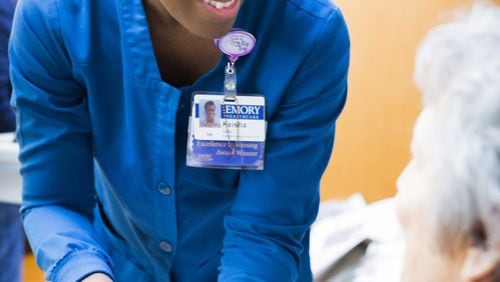Could a new year mean a new career?
Or, this could be a good time to examine your options with your current job and employer?
Let us help you start 2018 with a fresh look at your vocation with our Career Guide
1. Quiz time
You may be a brand-new nurse, or you might be more seasoned and contemplating a change to a new specialty. Either way, it may be time for a gut check.
Below are links to three quizzes that can help you gain some insight into the path that’s right for you.
Nursing Link at the job site Monster.com has a 30-question quiz http://nursinglink.monster.com/lpn-lvn-jobs/quizzes/34-whats-your-perfect-nursing-career-fit
Here’s a five-minute quiz from Johnson & Johnson: https://www.discovernursing.com/diagnostic
The magazine Scrubs last year offered this quiz that asks if you have what it takes to be a good nurse. http://scrubsmag.com/quiz-do-you-have-what-it-takes-to-be-a-good-nurse/
2. Who’s doing what in Georgia?
Licensed nurses in Georgia as of 11/27/2017
Type Count
Licensed Practical Nurse 30,716
Advanced Practice – CRNA 1,935
Advanced Practice – CNM 548
Advanced Practice – NP 10,129
Advanced Practice - CNS/PMH 230
Advanced Practice – CNS 164
Registered Professional Nurse 132,419
Licensed Undergraduate Nurse 1
3. Think about your options and opportunities
With several levels of nursing, from licensed practical nurse (LPN) to nurse practitioner, come a variety of career options. The same is true for educational options, including an Associate’s Degree in Nursing (ADN), Bachelor’s of Science in Nursing (BSN), Master of Science in Nursing (MSN) and doctorate in nursing. Here’s a look at the educational options and the doors they can potentially open.
Associate’s Degree in Nursing
While both an ADN and BSN pave the way to becoming a registered nurse, the ADN takes considerably less time, typically 18 to 24 months. Once you earn your degree, you’ll be required to take the NCLEX-RN exam before you actually become a registered nurse.
The exam ranges from 75–265 questions and covers such topics as a Safe and Effective Care Environment, Health Promotion and Maintenance, Psychosocial Integrity and Physiological Integrity.
Job prospects: Even though some hospitals prefer nurses with BSNs over ADNs, registered nurses who hold an Associate’s Degree in Nursing are still filling vacancies. The U.S. Bureau of Labor Statistics (BLS) expects employment of registered nurses overall to grow 15 percent from 2016–2026.
Nurses with an AND can earn about $65,000 a year, or about $32 an hour on average, according to some recent surveys. Pay can vary widely based on location, employer, and duties.
Some hospitals may provide at least partial tuition reimbursement for ADN nurses to go back to school and obtain a BSN.
Bachelor’s Degree in Nursing
The most common job option for graduates with a bachelor’s degree in nursing is a staff nurse or a nurse who works at the bedside or in direct patient care. Other career options for BSN graduates include specialties such as ICU nurse, emergency room nurse, operating room nurse, charge nurse and registered nurse supervisor. Earning a Bachelor of Science in Nursing (BSN) typically takes four years. Nurses can still become registered with an associate’s degree, but having a bachelor’s is increasingly becoming the expectation. Nurses are more apt to be offered advancement opportunities, such as management or specializations within nursing if they hold bachelor’s degrees. Passing the NCLEX-RN exam is a prerequisite to actually becoming a registered nurse.
Job prospects: BSN graduates can become specialized, such as ICU nurse, emergency room nurse, operating room nurse, charge nurse and registered nurse supervisor. These nurses work closely with patients in providing care, administering medication and overseeing a health management plan.
The median salary for a registered nurse was $67,490 in 2015. Nurses working at hospitals made a mean annual wage of $72,980 a year, while physicians’ offices paid a mean annual wage of $65,350.
Nurses who’ve earned their bachelor’s degree may go on to earn their Master of Science in Nursing (MSN), which allows them to achieve higher-paying jobs, such as chief nursing officer.
Master of Science in Nursing
Jobs available with a Master’s in Nursing degree include nursing consultant, research nurse, nurse educator, nurse administrator, advanced nurse practitioner and clinical nurse specialist. A Master’s Degree program typically lasts two years and can advance a career significantly. The average salary for a nurse consultant is $125,000 a year, for a research nurse is $90,000 and for a nurse educator is $77,000.
Once you hold a MSN degree, you can specialize in certain interesting fields of nursing, such as mental health care, pediatric care oncology. Some employers currently offer bonuses to those RNs who decide to go for their MSN degree and complete it. Stipulations may exist, such as needing to stay with the same employer for a number of years. However, this is a great way to offset part of the costs of the degree.
Job prospects: Although job prospects are good for all nursing professionals, those with an MSN degree have a greater number of career choices. Only those with a Ph.D. are able to have even more career opportunities.
Doctorate in Nursing
A Doctor of Nursing Practice won’t necessarily have career opportunities in hands-on nursing. The type of doctorate you earn will factor into the work you do. For example, a doctor of nursing practice (DNP) might work as a nurse executive in a hospital or clinic, while a doctor of nursing philosophy (Ph.D.) usually will focus on scholarly research. If you do work in a hospital or clinic after receiving your doctorate, you can expect to manage other nurses and staff.
There are four different types of nursing doctorate degrees to choose from and each one is specific to a certain path in the nursing field.
• Doctor of Nursing Practice (DNP): Emphasis on clinical practice-oriented leadership training. The DNP is meant for nurses in direct patient care. It is actually a practice doctorate. Nurses who enter these programs are educated as nurse practitioners, clinical nurse specialists, midwives or nurse anesthetists. Some programs do offer curriculum for nurse administrators or nurse educators, but the goal of the DNP is to translate research into practice. In other words to take research or evidence and put it in place in the practice setting and evaluate the outcomes. The PhD’s do the research,and the DNP’s translate that research into practice.
• Doctor of Nursing (ND): Focus is on developing advanced specialist skills.
• Doctor of Nursing Science (DNSc): Focus is on investigative and research skills.
• Doctor of Nursing Philosophy (Ph.D.): Emphasizes scholarly research and inquiry.
It will take an average of four to six years to complete your doctorate.
A DNP is needed to assume some of the highest level positions. According to studies, those with a DNP earn about $7,688 more a year than those in a similar position holding only a master’s degree.
4. Get down to the nitty-gritty.
Staff Nurse RN Salaries in Atlanta as of October 2017
Job Title
Salary
Location
Date Updated
Staff Nurse - RN - Occupational Health
$81,319
Atlanta, GA
October 30, 2017
Staff Nurse - RN - Burn
$64,683
Atlanta, GA
October 30, 2017
Staff Nurse - RN - Research
$78,168
Atlanta, GA
October 30, 2017
Staff Nurse - RN - Operating Room
$72,454
Atlanta, GA
October 30, 2017
Staff Nurse - RN - Infusion Therapy
$82,719
Atlanta, GA
October 30, 2017
Staff Nurse - RN - Geriatric
$65,788
Atlanta, GA
October 30, 2017
Staff Nurse - RN - Obstetrics
$67,960
Atlanta, GA
October 30, 2017
Staff Nurse - RN - Oncology
$70,561
Atlanta, GA
October 30, 2017
Staff Nurse - RN - Hospice
$68,686
Atlanta, GA
October 30, 2017
Staff Nurse - RN III
$82,487
Atlanta, GA
October 30, 2017
5. Don’t forget the details.
Licensure info here
Mandatory continuing education for LPNs and RNs
As of March 31, 2017, all licensed practical nurses must complete 20 hours of continuing education as a condition of license renewal. Licensees may select one of two options to fulfill the continuing competency/education requirements. Option 1: complete 20 hours of continuing education by a state Board of Nursing approved provider. Option 2: Complete an accredited academic program of study in registered nursing as recognized by the state Board of Nursing. A list of acceptable programs is available at www.sos.ga.gov/plb/nursing.
All registered nurses must complete continuing education/competency requirements for licensure renewal. State law offers licensees five choices to fulfill continuing competency requirements. For details, see this reference document from the Georgia Board of Nursing: http://sos.ga.gov/PLB/acrobat/Forms/38%20Reference%20-%20Continuing%20Education%20Packet.pdf
Multi-state licensure plan being watched closely
The enhanced Nurse Licensure Compact (eNLC) is set for implementation on Jan. 19, 2018, but there have been some snags so Georgia nurses are watching closely. The eNLC allows registered nurses (RNs) and licensed practical/vocational nurses (LPN/VNs) to have one multistate license, with the privilege to practice in their home state and other eNLC states. The goal of the compact is to increase access to health care, protect patient safety, reduce costs and support state-of-the-art health care delivery. It also is designed to enhance nurses’ ability to quickly cross state borders when there is a disaster. New provisions to the eNLC require uniform license requirements in all states and give states the authority to obtain and submit criminal background checks.
To receive a multistate license in the eNLC, nurses must meet the home state’s qualifications, graduate from a Board of Nursing-approved nursing education program, pass the NCLEX-RN® or NCLEX-PN® Exam, have no active discipline on their license, submit to a criminal background check, have no prior state or federal felony convictions and have a valid Social Security number.
If you are already licensed as a registered nurse or licensed practical nurse in Georgia and this is your state of residency, you will soon be able to apply to convert your single state license to a multistate license. As of Nov. 13, the necessary technological updates have not been finalized and the Board was not yet accepting applications to convert a single state license to a multistate license. Go to www.sos.ga.gov/plb/nursing for updates regarding the eNLC status.
6. Get some great advice.
“My advice to potential students is to get as much education as you can and choose your school wisely. Health care is extremely complicated and patients are often acutely ill or suffering from multiple health issues. This requires the nurse to be highly educated to meet these demands. Nurses today need to critically think, prioritize multiple patients’ needs, have good judgment and extremely refined assessment and communication skills. Potential students should investigate the nursing program to make sure it is nationally accredited, have good NCLEX passage scores, have strong clinical partnerships that allow for direct patient contact in a variety of healthcare situations and sufficient faculty and resources to meet student needs.”
- Sharon Radzyminski, professor and chair of the School of Nursing, Georgia Southern University, Statesboro
“An experienced nurse is incredibly valuable to any employer. But when this same experienced nurse enters a new area of the nursing field, there is a learning curve. It is important to allow yourself time to be a novice. Learning something new is often exciting, rewarding, and motivating. Fortunately for nurses, we have lots of choices. One of the most important factors to me is to choose a work environment that allows me to provide meaningful work in a place which maintains a culture of respect for all employees.”
Linda A. Streit, dean and professor at Georgia Baptist College of Nursing, Mercer University, Atlanta






